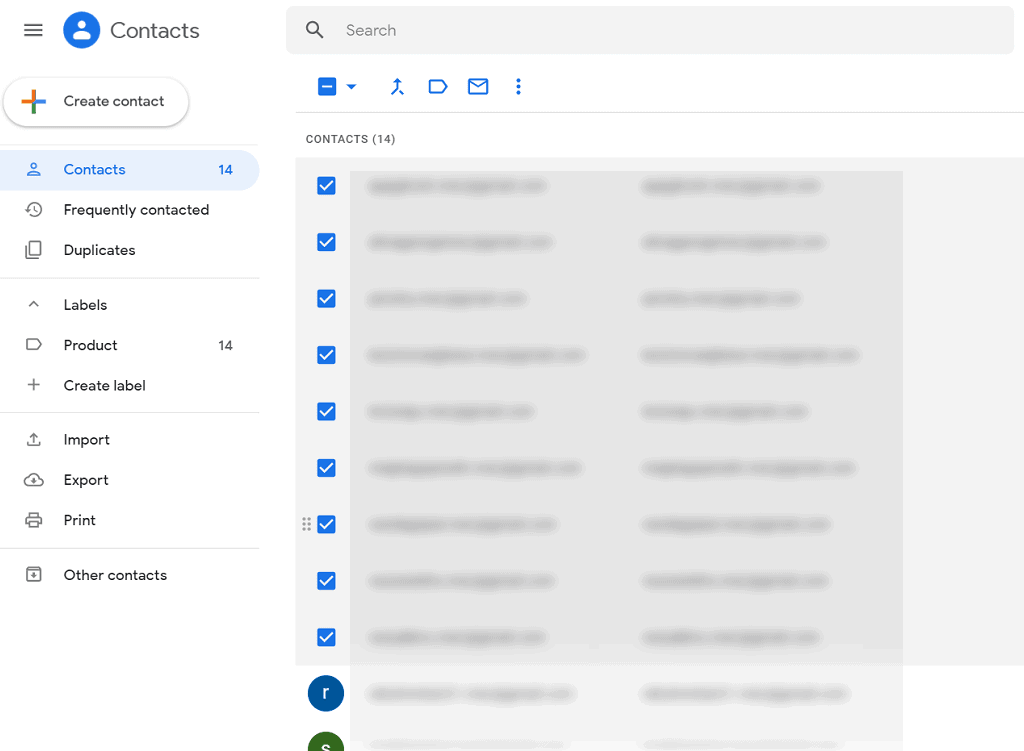20 Handy Facts For Choosing Email List Sellers
Wiki Article
What Should I Be Thinking About When Purchasing A Family Medicine Email Database?
To ensure you are getting high-quality, accurate and legally compliant information to support your outreach or marketing campaign, there are a variety of factors to consider. What to consider is 1. Data Quality and Accuracy
Data Source Check to see if the service is collecting information from trustworthy and verified sources like medical directories or licensing boards. The email addresses of family medicine professionals should be current, up to date and suited to your intended group of patients.
Verification Process - Ask the provider about their verification process. Email addresses that are inactive or are incorrectly listed should be removed from the list. Validated email addresses can decrease bounces and increase deliverability.
Segmentation options This list should contain segmentation options based on factors such as the location (country or state) and degree of experience, size of practice and specific interests (e.g. pediatrics or geriatrics, or preventive medicine). Segmentation is a way to boost engagement by utilizing more specific outreach.
2. Legal Regulations
Data Privacy Laws â Ensure you comply with the General Regulations on Data Protection in Europe and the California Consumer Privacy Acts in the U.S.A. To avoid any regulatory penalties email addresses must be collected legally.
CANSPAM Act Compliance When you run an email marketing campaign in the U.S.A. make sure that your list complies with the CANSPAM Act. This means offering clear opt-out options and avoiding misleading subject lines or false details in your emails.
Confirm opt-in consent was granted to gather the email address. This signifies that the family medicine doctor has agreed to receive emails from third party marketers. This ensures compliance with privacy laws, and also reduces complaints about spam.
3. Provider Reputation
Reputable Supplier: Pick one that has an excellent record of providing data which is compliant and of high quality. You can look up reviews, testimonials, or case studies of the provider to determine if that they're trustworthy.
Transparency. Providers must be open and transparent about the methods used to collect data, and also the frequency with which they update their data. If the company doesn't know where to get their data, that's an alarming indicator.
Customer Support: Find providers who provide a high-quality customer service. It is possible that you require assistance with technical issues, list segmentation or making sure that the list conforms with the regulations.
4. Return on investment (ROI) and cost
Pricing models. There are a variety of pricing options that include flat fees or subscription services. Choose a pricing structure that is compatible with your budget and guarantees you a decent return.
Refund and Replacement Policy Trustworthy suppliers offer an option to replace or refund for invalid or outdated email addresses that are invalid or outdated. Be sure to read all the conditions and terms prior to you make a purchase.
Do not fixate on the cost by itself. While a cheaper list might look appealing, it might cause poor delivery and high bounce rates. A high-quality list will provide better targeted advertising, better engagement rates and a higher return on investment.
5. Data Ownership and Usage
Single Use vs. Make clear multiple uses: If you're able to utilize the list more than once, or if this is a one-time-use only. Lists that are able to be used in multiple campaigns provide more value. This is particularly important when you're planning to conduct regular outreach.
Exclusive vs. Shared lists: Determine whether the list is yours only or sold to multiple buyers. Exclusive lists may lead to fewer oversaturated audiences.
6. Data Integration and Format
CRM compatibility: Make sure you have your email list in a format compatible with your CRM system (CRM), or the email marketing tool you use. (Example, CSV). This will allow for an easy integration.
Ease of Use: Ensure that your list is well-organized and simple to filter or segment based on the key criteria to your campaign. This will streamline targeting and communication efforts.
7. Ethical Besorgnization
Relevance of Outreach physicians are busy people, so it is important that you ensure that your outreach is relevant to their work. Avoid using generic or insensitive messages as it could damage your brand image and lead to low engagement.
Beware of Spam Methods. Send emails with care. Don't over-email. If you send recipients a flood of unrelated emails or excessively, it could result in unsubscribes, complaints about spam and a damaged reputation.
If you're looking to make sure that your outreach is successful, think about the following elements when you purchase a Family Medicine Email List: Quality of data as well as legal compliance and reputation. Find validated, segmented information that is compliant with privacy laws and aligned with your target people. By investing in a high-quality list and sending relevant marketing messages will help you increase engagement rates and increase your return on investment. See the top rated family medicine email list for blog recommendations.

What Factors Should I Consider When Buying An Urgentcare Email List?
It's crucial to think about a number of factors when purchasing an email list for urgent care. This will help ensure that the list you purchase is accurate legal, in compliance with laws, and pertinent to your marketing goals. Here are the main considerations:1. Quality of data and accuracy
Data source: Ensure that the provider is obtaining their data from reliable sources, such as medical associations or databases for healthcare. Avoid lists created through scraping or other unreliable methods since they may contain inaccurate or outdated information.
Verification Procedure: Confirm that the list of email addresses is updated and verified regularly. A trustworthy provider will use a strict verification process to eliminate invalid or outdated email addresses. This improves deliverability and decreases bounce rates.
Segmentation and Targeting: The list should offer segmentation options including the location (city, state, region) and the dimensions of the urgent care center as well as the types of services offered (e.g., diagnostics, pediatrics) and the decision-makers' roles (e.g. doctors or practice owners, etc.). The lists that are targeted increase participation rate and increase the relevance.
2. Legal Regulations
Data Privacy Laws: Ensure the compliance of local and national regulations, including the California Consumer Privacy Act, that is in force to the U.S.A. and also as applicable European data protection laws. This means email addresses should be collected with proper consent and processed in a legal manner.
CAN-SPAM Act Compliance: in the U.S., your email marketing campaigns must comply with the CAN-SPAM Act. Include your physical address, avoid misleading subject lines and provide an easy opt-out mechanism. Infractions could lead to penalties or damage to the image of your brand.
Opt-In Consent - Ensure that the people who have the email address you have on your list have consented to receiving marketing communications from third party companies. This helps reduce complaints about spam and legal issues.
3. Provider Reputation
Established Providers: Choose a service provider that has established track records of offering high-quality and reliable lists. Look through the testimonials, case studies and testimonials from past clients to determine the company's client satisfaction.
Transparency. Providers must be transparent about the way in which the data is obtained, as well as the frequency at which they update their data. If the data provider is not able to give you clear answers, then it may indicate poor-quality data.
Customer Support: A solid customer support team is crucial for those who require help in tackling technical issues, list customization or compliance. A customer-friendly service will help you maximize the value of your database for email.
4. Cost and Return on Investement (ROI).
Pricing models. Email list providers generally offer a variety of pricing options, such as flat costs or pay per contact. You should consider pricing models in relation to your marketing budget and anticipated returns. Check the cost and quality of the list with relevant data.
Refund or replacement policy. Reputable providers offer the option of refunds or replacement policies in the event that the majority of their emails are not valid or non-deliverable. Before you purchase, ensure you know the terms of any policy.
Value for money: Do not choose the most expensive option. Instead, look for lists that are reliable and include a thorough segmentation. A high-quality list improves engagement rates and will yield a higher return from your investment.
5. Use and Ownership of Data
It is a single-use or multi-use? You need to know whether you can utilize this list for one campaign, or many times. Lists that permit multiple uses offer better value. This is especially true when you plan to run ongoing campaigns.
Exclusive vs. Shared lists: Decide if the list belongs exclusively to your business or shared with other buyers. Shared lists can cause list fatigue because recipients will receive multiple marketing messages.
6. Data Integration and Format
CRM Compatibility: Make sure that your email list is delivered to you in a format that is compatible with that is compatible with CRM, for example CSV (Comma Separated Values) or Excel. This allows for a seamless integration, allowing you to begin your campaign right away.
Ease-of-Use: The list should be simple to manage, and you can divide it according to your requirements. An organized email list allows you to target and personalize your messages.
7. Ethical Considerations
Relevance: Urgent care professionals can be busy so you should ensure that your content is relevant and useful. Tailor your messaging to their specific needs, such as medical equipment, supplies, or healthcare technology that is compatible with urgent care operations. Inappropriate content could damage your brand's image and reduce engagement.
Be mindful of how often you send out emails. Unsolicited or excessive emails can result in spam complaints and lower your sender reputation.
The article's conclusion is:
Be sure to consider the accuracy of the data as well as the legal compliance and the reputation of the company you choose to purchase an email list for urgent assistance. Lists should be segmented regularly and should adhere to privacy laws. You can increase engagement by investing in a properly-targeted, high-quality list and sending relevant content. Check out the most popular urgent care email list for website recommendations.
